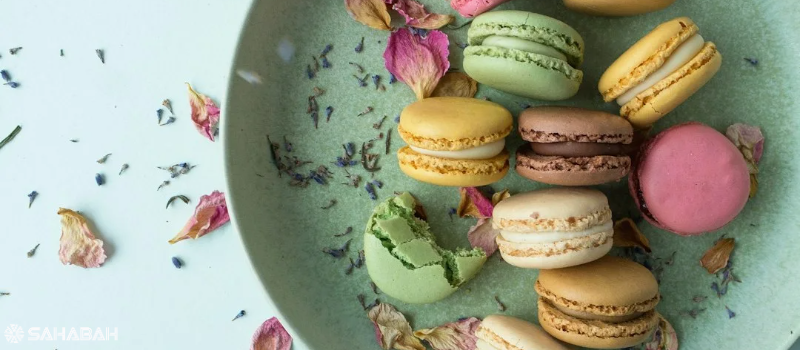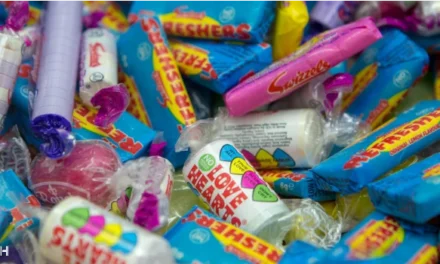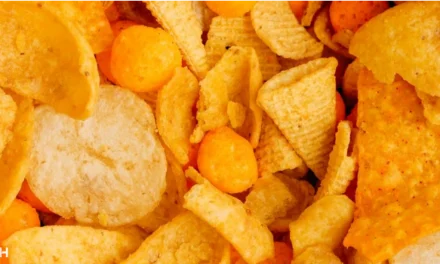Macarons, the delicate almond meringue-based treats, have taken the world by storm in recent years. These colorful sandwich cookies with their delightfully crisp exterior and soft, gooey interior have become a beloved indulgence across cultures. However, for those following halal dietary laws, the question remains: are macarons halal?
While these French delicacies may seem harmless at first glance, there’s been ongoing confusion and debate surrounding their permissibility in Islam. This comprehensive guide aims to provide clarity on the halal status of macarons, addressing common concerns and offering practical tips for enjoying these treats within religious guidelines.
What Makes Food Halal or Haram?
Before diving into the specifics of macarons, it’s essential to understand the fundamental principles of halal and haram in Islam. Halal refers to anything permissible or lawful according to Islamic teachings, while haram encompasses anything prohibited or unlawful.
In terms of food, Islamic dietary laws strictly prohibit the consumption of:
- Pork and pork-derived products
- Alcohol and other intoxicating substances
- Carnivorous animals with fangs or claws
- Animals not slaughtered according to Islamic rites (halal slaughtering methods)
- Foods contaminated with any of the above-mentioned prohibited components
Additionally, Islam places great emphasis on avoiding cross-contamination and ensuring the proper handling and preparation of halal foods.
Traditional Macaron Ingredients
To determine whether macarons are halal, we must first examine their core ingredients:
- Almond flour/meal: Almonds are considered halal and widely consumed in Muslim communities.
- Egg whites: Eggs from permissible fowl, such as chickens, are halal.
- White granulated/powdered sugar: The source and processing of sugar can raise some concerns, which we’ll address in the next section.
- Flavorings/Extracts: Potential issues may arise if these contain alcohol or other non-halal components.
- Food colorings: Natural food dyes are generally considered halal, but some artificial colors may be derived from non-halal sources.
Are the Core Ingredients in Macarons Halal?
Almonds and Egg Whites
Almonds and egg whites, which form the base of macarons, are universally considered halal by Islamic scholars and organizations worldwide.
Sugar
The halal status of sugar is a bit more complex and depends on its source and processing methods. While granulated sugar derived from sugarcane is widely accepted as halal, some Muslim communities have raised concerns about sugar derived from beets due to the potential use of bone char (animal-derived) in the refining process.
However, reputable certifying bodies, such as the Islamic Food and Nutrition Council of America (IFANCA) and the Muslim Consumer Group (MCG), have deemed granulated sugar halal after extensive research and investigation into the manufacturing processes used by major sugar producers.
It’s worth noting that while powdered sugar may contain small amounts of cornstarch as an anti-caking agent, this is generally considered halal as well.
Variations & Potential Halal Concerns
While the core ingredients in traditional macarons are halal-compliant, variations and fillings can introduce potential issues. Here are some common concerns:
- Flavored/Filled Macarons: Chocolate, coffee, and cream-based fillings are generally halal, but caution should be exercised with alcohol-based flavors or extracts.
- Coloring Agents: Natural food dyes derived from plants, vegetables, or fruits are halal. However, some artificial colors may be derived from non-halal sources, such as insects or animal products.
- Cross-Contamination: If macarons are produced in facilities that also handle non-halal ingredients, there is a risk of cross-contamination, which can render the treats haram.
Halal-Certified Macaron Brands
To ensure complete peace of mind, many Muslim consumers opt for halal-certified macaron brands. These brands have undergone rigorous inspection and verification processes to ensure their products comply with Islamic dietary laws.
Some popular halal-certified macaron makers include:
- Miss Macaroon (Singapore)
- Patisserie Gourmandise (Malaysia)
- Macaron Parlour (USA)
- La Patisserie des Rêves (France)
When purchasing from these brands, look for halal certification symbols or logos from recognized Islamic organizations, such as IFANCA, MUIS (Singapore), or JAKIM (Malaysia).
Making Macarons at Home
If you prefer to bake your own macarons at home, it’s essential to ensure that all ingredients and equipment are halal-certified or sourced from trusted halal suppliers. Here are some tips:
- Use halal-certified almond flour, eggs, and granulated sugar.
- Avoid alcohol-based extracts or flavorings. Instead, opt for halal-certified vanilla extract or natural flavors like rose water or orange blossom water.
- If using food colorings, stick to natural dyes derived from plants, vegetables, or fruits.
- Ensure all baking equipment and surfaces are thoroughly cleaned and free from any non-halal residues or cross-contamination.
FAQs about Halal Macarons
Can you get halal macarons at regular bakeries?
It’s possible to find halal macarons at regular bakeries, but you’ll need to carefully check the ingredient lists and production methods. Many bakeries use alcohol-based extracts or artificial colorings that may not be halal-compliant. Additionally, there’s always a risk of cross-contamination if the bakery handles non-halal products.
Are French macarons from Paris halal?
While macarons originated in France, their halal status depends on the specific ingredients and production methods used by each patisserie. Some Parisian macaron shops may use halal-compliant ingredients and processes, while others may not. It’s always best to inquire about the details or look for halal certification before purchasing.
How to verify ingredient sources for home baking?
When baking macarons at home, it’s crucial to verify the halal status of your ingredients. Look for halal certification logos on product packaging or contact the manufacturers directly to inquire about their sourcing and processing methods. Additionally, consider purchasing from trusted halal grocery stores or online suppliers.
What are some halal-friendly macaron flavors?
Some delicious and halal-friendly macaron flavor options include:
- Vanilla
- Pistachio
- Raspberry
- Lemon
- Rose water
- Orange blossom
You can also experiment with natural fruit purees or essences to create your own unique flavors.
Conclusion
Macarons, with their core ingredients of almond flour, egg whites, and granulated sugar, are generally considered halal by Islamic scholars and organizations. However, it’s crucial to exercise caution with variations that may include non-halal components, such as alcohol-based flavors or artificial colorings derived from animal products.
For complete peace of mind, many Muslim consumers opt for halal-certified macaron brands or meticulously source their ingredients when baking at home. By following these guidelines and exercising due diligence, Muslims can enjoy these delightful French treats while staying true to their religious beliefs.
Remember, the key to enjoying halal macarons is to always check labels, rely on trusted halal certifications, and prioritize transparency in the sourcing and production processes. With a little effort, these sweet indulgences can be a part of celebrations, gifting occasions, or simply a treat to savor while upholding Islamic dietary principles.
Frequently Asked Question: Are Macarons Halal?
Yes, macarons can be halal if they are made with halal-certified ingredients and without any non-halal additives such as gelatin.
Do macarons contain gluten?
Traditional macarons are made with almond flour, which is gluten-free. However, cross-contamination with gluten-containing ingredients may occur during production, so it’s best to check with the manufacturer if you have gluten sensitivities.
Can I order a gift box of macarons for delivery?
Yes, many bakeries and online macaron shops offer gift box options for delivery. You can select the flavors and quantity you’d like to include in the gift box.
What are some of the top posts related to macarons?
For recommendations, recipes, and frequently asked questions about macarons, you can check out popular food blogs, online forums, and social media platforms.
Are macarons suitable for weddings or birthdays?
Yes, macarons are a popular choice for weddings, birthdays, and other special occasions. They come in a variety of flavors and can be customized to match the theme of your event.
How do I choose from the range of flavors available for macarons?
When ordering macarons, you can usually select from a range of flavors such as chocolate, vanilla, raspberry, pistachio, and more. Consider your preferences or consult with the supplier for recommendations.
Do halal macarons come with a certification?
Some bakeries offer halal-certified macarons, which come with an official certification indicating that the ingredients and production process comply with halal standards.
Q: Is it possible to find Halal macarons in your selection?
Yes, we offer a range of flavours of Halal-certified macarons in our selection.
Do your macarons contain any gelatin or gluten?
Our macarons are gluten-free and do not contain any gelatin.
Can I choose a gift box for the macarons I order?
Yes, you can select a gift box option for the macarons you order to create a lovely gift.
How long does the delivery of macarons typically take?
Our delivery service usually takes 24 hours from the time of ordering.
Are your macarons officially halal certified?
Yes, our macarons are officially halal certified for your peace of mind.
What is the size of the macarons you offer?
Our macarons come in a standard size for a delightful dessert experience.
Can I find guidance on choosing macarons for a wedding or birthday celebration?
Please refer to our frequently asked questions (FAQ) section for guidance on choosing macarons for special occasions like weddings or birthdays.





